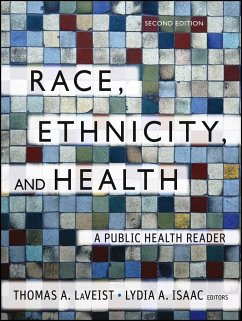Race, Ethnicity, and Health
A Public Health Reader
Herausgegeben von LaVeist, Thomas A.; Isaac, Lydia A.
Race, Ethnicity, and Health
A Public Health Reader
Herausgegeben von LaVeist, Thomas A.; Isaac, Lydia A.
- Broschiertes Buch
- Merkliste
- Auf die Merkliste
- Bewerten Bewerten
- Teilen
- Produkt teilen
- Produkterinnerung
- Produkterinnerung
Race, Ethnicity and Health, Second Edition, is a new and critical selection of hallmark articles that address health disparities in America. It effectively documents the need for equal treatment and equal health status for minorities. Intended as a resource for faculty and students in public health as well as the social sciences, it will be also be valuable to public health administrators and frontline staff who serve diverse racial and ethnic populations. The book brings together the best peer reviewed research literature from the leading scholars and faculty in this growing field, providing…mehr
Andere Kunden interessierten sich auch für
![Designing and Conducting Health Surveys Designing and Conducting Health Surveys]() Lu A. AdayDesigning and Conducting Health Surveys86,99 €
Lu A. AdayDesigning and Conducting Health Surveys86,99 €![Ethnicity, Race, and Disease Sourcebook, 1st Edition Ethnicity, Race, and Disease Sourcebook, 1st Edition]() Ethnicity, Race, and Disease Sourcebook, 1st Edition88,99 €
Ethnicity, Race, and Disease Sourcebook, 1st Edition88,99 €![Health Care Reform Now! Health Care Reform Now!]() George C. HalvorsonHealth Care Reform Now!22,99 €
George C. HalvorsonHealth Care Reform Now!22,99 €![The Social Basis of Medicine The Social Basis of Medicine]() Andrew RussellThe Social Basis of Medicine47,99 €
Andrew RussellThe Social Basis of Medicine47,99 €![Global Health and International Relations Global Health and International Relations]() Colin McinnesGlobal Health and International Relations74,99 €
Colin McinnesGlobal Health and International Relations74,99 €![Quality by Design Quality by Design]() Eugene C. NelsonQuality by Design93,99 €
Eugene C. NelsonQuality by Design93,99 €![The Covid-19 Catastrophe The Covid-19 Catastrophe]() Richard HortonThe Covid-19 Catastrophe72,99 €
Richard HortonThe Covid-19 Catastrophe72,99 €-
-
-
Race, Ethnicity and Health, Second Edition, is a new and critical selection of hallmark articles that address health disparities in America. It effectively documents the need for equal treatment and equal health status for minorities. Intended as a resource for faculty and students in public health as well as the social sciences, it will be also be valuable to public health administrators and frontline staff who serve diverse racial and ethnic populations. The book brings together the best peer reviewed research literature from the leading scholars and faculty in this growing field, providing a historical and political context for the study of health, race, and ethnicity, with key findings on disparities in access, use, and quality. This volume also examines the role of health care providers in health disparities and discusses the issue of matching patients and doctors by race.
There has been considerable new research since the original manuscript's preparation in 2001 and publication in 2002, and reflecting this, more than half the book is new content. New chapters cover: reflections on demographic changes in the US based on the current census; metrics and nomenclature for disparities; theories of genetic basis for disparities; the built environment; residential segregation; environmental health; occupational health; health disparities in integrated communities; Latino health; Asian populations; stress and health; physician/patient relationships; hospital treatment of minorities; the slavery hypertension hypothesis; geographic disparities; and intervention design.
Hinweis: Dieser Artikel kann nur an eine deutsche Lieferadresse ausgeliefert werden.
There has been considerable new research since the original manuscript's preparation in 2001 and publication in 2002, and reflecting this, more than half the book is new content. New chapters cover: reflections on demographic changes in the US based on the current census; metrics and nomenclature for disparities; theories of genetic basis for disparities; the built environment; residential segregation; environmental health; occupational health; health disparities in integrated communities; Latino health; Asian populations; stress and health; physician/patient relationships; hospital treatment of minorities; the slavery hypertension hypothesis; geographic disparities; and intervention design.
Hinweis: Dieser Artikel kann nur an eine deutsche Lieferadresse ausgeliefert werden.
Produktdetails
- Produktdetails
- Public Health/Vulnerable Populations .
- Verlag: Wiley & Sons
- 2. Aufl.
- Seitenzahl: 848
- Erscheinungstermin: 16. Oktober 2012
- Englisch
- Abmessung: 236mm x 175mm x 43mm
- Gewicht: 1338g
- ISBN-13: 9781118049082
- ISBN-10: 111804908X
- Artikelnr.: 36026299
- Herstellerkennzeichnung
- Libri GmbH
- Europaallee 1
- 36244 Bad Hersfeld
- gpsr@libri.de
- Public Health/Vulnerable Populations .
- Verlag: Wiley & Sons
- 2. Aufl.
- Seitenzahl: 848
- Erscheinungstermin: 16. Oktober 2012
- Englisch
- Abmessung: 236mm x 175mm x 43mm
- Gewicht: 1338g
- ISBN-13: 9781118049082
- ISBN-10: 111804908X
- Artikelnr.: 36026299
- Herstellerkennzeichnung
- Libri GmbH
- Europaallee 1
- 36244 Bad Hersfeld
- gpsr@libri.de
Thomas A. LaVeist, Ph.D. is William C. and Nancy F. Richardson Professor in Health Policy and Director of the Hopkins Center for Health Disparities Solutions at the Johns Hopkins Bloomberg School of Public Health. He is a frequent visiting lecturer on minority health issues at other universities. He is also a frequent speaker at professional conferences and workshops sponsored by leading public health professional associations. Dr. LaVeist consults often with federal agencies and healthcare organizations on minority health and cultural competency issues and racial disparities in health. He has conducted several important studies of minority health. His research on minority health has been funded by the National Institutes of Health, National Center on Minority Health and Health Disparities, Center for Disease Control, Agency for Healthcare Research and Quality, Brookdale Foundation, Commonwealth Fund, Russell Sage Foundation and the Kaiser Family Foundation. Lydia Isaac, PhD, is assistant professor and fieldwork coordinator, Community Health, Department of Urban Public Health, Hunter College. She formerly served with the Hopkins Center for Health Disparities Solutions. Dr. Isaac's research interests include translating research into policy and practice, racial and ethnic health disparities, the social determinants of health and the neighborhood environment and its role in health promotion.
Sources xi
The Editors xv
The Authors xvii
Introduction: The Ethnic Demographic Transition 1
Thomas A. LaVeist
Chapter 1 Defining Health and Health Care Disparities and Examining
Disparities Across the Life Span 11
Lydia A. Isaac
Part 1 Historical and Political Considerations
Chapter 2 The Color Line: Race Matters in the Elimination of Health
Disparities 35
Stephen B. Thomas
Chapter 3 Health Care Disparities-Science, Politics, and Race 41
M. Gregg Bloche
Part 2 Conceptualizing Race and Ethnicity
Chapter 4 Why Genes Don't Count (for Racial Differences in Health) 49
Alan H. Goodman
Chapter 5 Using "Socially Assigned Race" to Probe White Advantages in
Health Status 57
Camara Phyllis Jones, Benedict I. Truman, Laurie D. Elam-Evans, Camille A.
Jones, Clara Y. Jones, Ruth Jiles, Susan F. Rumisha, Geraldine S. Perry
Part 3 Explaining Racial and Ethnic Disparities Psychosocial and
Individual-Level Determinants 77
Chapter 6 Racism as a Stressor for African Americans: A Biopsychosocial
Model 79
Rodney Clark, Norman B. Anderson, Vernessa R. Clark, David R. Williams
Chapter 7 A Systematic Review of Empirical Research on Self-Reported Racism
and Health 105
Yin Paradies
Chapter 8 Stress, Coping, and Health Outcomes among African-Americans: A
Review of the John Henryism Hypothesis 139
Gary G. Bennett, Marcellus M. Merritt, John J. Sollers III, Christopher L.
Edwards, Keith E. Whitfi eld, Dwayne T. Brandon, Reginald D. Tucker-Seeley
Chapter 9 Race and Unhealthy Behaviors: Chronic Stress, the HPA Axis, and
Physical and Mental Health Disparities over the Life Course 159
James S. Jackson, Katherine M. Knight, Jane A. Rafferty
Chapter 10 Epigenetics and the Embodiment of Race: Developmental Origins of
U.S. Racial Disparities in Cardiovascular Health 175
Christopher W. Kuzawa, Elizabeth Sweet
The Effects of Culture 213
Chapter 11 Acculturation and Latino Health in the United States: A Review
of the Literature and Its Sociopolitical Context 215
Marielena Lara, Cristina Gamboa, M. Iya Kahramanian, Leo S. Morales, David
E. Hayes Bautista
Chapter 12 Measuring Culture: A Critical Review of Acculturation and Health
in Asian Immigrant Populations 253
Talya Salant, Diane S. Lauderdale
Chapter 13 Racial Influences Associated with Weight-Related Beliefs in
African American and Caucasian Women 291
Christie Z. Malpede, Lori F. Greene, Stephanie L. Fitzpatrick, Wendy K.
Jefferson, Richard M. Shewchuk, Monica L. Baskin, Jamy D. Ard
Chapter 14 Adverse Pregnancy Outcomes: Differences Between U.S.- and
Foreign-Born Women in Major U.S. Racial and Ethnic Groups 303
Gopal K. Singh, Stella M. Yu
Social Determinants 321
Chapter 15 Levels of Racism: A Theoretic Framework and a Gardener's Tale
323
Camara Phyllis Jones
Chapter 16 Racial Residential Segregation: A Fundamental Cause of Racial
Disparities in Health 331
David R. Williams, Chiquita Collins
Chapter 17 Life Course Theories of Race Disparities: A Comparison of the
Cumulative Dis/Advantage Theory Perspective and the Weathering Hypothesis
355
Roland J. Thorpe Jr., Jessica A. Kelley-Moore
Chapter 18 U.S. Socioeconomic and Racial Differences in Health: Patterns
and Explanations 375
David R. Williams, Chiquita Collins
Chapter 19 Exploring Health Disparities in Integrated Communities 419
Thomas A. LaVeist
Environmental Determinants 437
Chapter 20 Race/Ethnicity, the Social Environment, and Health 439
Marsha Lillie-Blanton, Thomas A. LaVeist
Chapter 21 Built Environments and Obesity in Disadvantaged Populations 455
Gina S. Lovasi, Malo A. Hutson, Monica Guerra, Kathryn M. Neckerman
Chapter 22 Health Risk and Inequitable Distribution of Liquor Stores in
African American Neighborhoods 485
Thomas A. LaVeist, John M. Wallace Jr.
Chapter 23 Environmental Health Disparities: A Framework Integrating
Psychosocial and Environmental Concepts 493
Gilbert C. Gee, Devon C. Payne-Sturges
Chapter 24 Sick and Tired of Being Sick and Tired: Scientifi c Evidence,
Methods, and Research Implications for Racial and Ethnic Disparities in
Occupational Health 523
Linda Rae Murray
Part 4 Health Services and Health System Effects Patients 539
Chapter 25 Attitudes About Racism, Medical Mistrust, and Satisfaction with
Care Among African American and White Cardiac Patients 541
Thomas A. LaVeist, Kim J. Nickerson, Janice V. Bowie
Chapter 26 The Legacy of Tuskegee and Trust in Medical Care: Is Tuskegee
Responsible for Race Differences in Mistrust of Medical Care? 557
Dwayne T. Brandon, Lydia A. Isaac, Thomas A. LaVeist
Chapter 27 Patient Race/Ethnicity and Quality of Patient-Physician
Communication during Medical Visits 569
Rachel L. Johnson, Debra Roter, Neil R. Powe, Lisa A. Cooper
Providers 587
Chapter 28 Implicit Bias among Physicians and Its Prediction of
Thrombolysis Decisions for Black and White Patients 589
Alexander R. Green, Dana R. Carney, Daniel J. Pallin, Long H. Ngo, Kristal
L. Raymond, Lisa I. Iezzoni, Mahzarin R. Banaji
Chapter 29 The Effect of Patient Race and Socio-Economic Status on
Physicians' Perceptions of Patients 607
Michelle van Ryn, Jane Burke
Chapter 30 Ethnicity and Analgesic Practice 637
Knox H. Todd, Christi Deaton, Anne P. D'Adamo, Leon Goe
Chapter 31 The Effect of Race and Sex on Physicians' Recommendations for
Cardiac Catheterization 647
Kevin A. Schulman, Jesse A. Berlin, William Harless, Jon F. Kerner, Shyrl
Sistrunk, Bernard J. Gersh, Ross Dubé, Christopher K. Taleghani, Jennifer
E. Burke, Sankey Williams, John M. Eisenberg, José J. Escarce
System 665
Chapter 32 Advancing Health Disparities Research within the Health Care
System: A Conceptual Framework 667
Amy M. Kilbourne, Galen Switzer, Kelly Hyman, Megan Crowley-Matoka, Michael
J. Fine
Chapter 33 Linking Cultural Competence Training to Improved Health
Outcomes: Perspectives from the Field 689
Joseph R. Betancourt, Alexander R. Green
Chapter 34 "We Don't Carry That"-Failure of Pharmacies in Predominantly
Nonwhite Neighborhoods to Stock Opioid Analgesics 697
R. Sean Morrison, Sylvan Wallenstein, Dana K. Natale, Richard S. Senzel,
Lo-Li Huang
Chapter 35 Do Hospitals Provide Lower-Quality Care to Minorities than to
Whites? 707
Darrell J. Gaskin, Christine S. Spencer, Patrick Richard, Gerard F.
Anderson, Neil R. Powe, Thomas A. LaVeist
Part 5 Health Disparities Solutions
Chapter 36 Linking Science and Policy through Community-Based Participatory
Research to Study and Address Health Disparities 723
Meredith Minkler
Chapter 37 The National Health Plan Collaborative to Reduce Disparities and
Improve Quality 741
Nicole Lurie, Allen Fremont, Stephen A. Somers, Kathryn Coltin, Andrea
Gelzer, Rhonda Johnson, Wayne Rawlins, Grace Ting, Winston Wong, Donna
Zimmerman
Chapter 38 Interventions to Reduce Racial and Ethnic Disparities in Health
Care 761
Marshall H. Chin, Amy E. Walters, Scott C. Cook, Elbert S. Huang
Index 787
The Editors xv
The Authors xvii
Introduction: The Ethnic Demographic Transition 1
Thomas A. LaVeist
Chapter 1 Defining Health and Health Care Disparities and Examining
Disparities Across the Life Span 11
Lydia A. Isaac
Part 1 Historical and Political Considerations
Chapter 2 The Color Line: Race Matters in the Elimination of Health
Disparities 35
Stephen B. Thomas
Chapter 3 Health Care Disparities-Science, Politics, and Race 41
M. Gregg Bloche
Part 2 Conceptualizing Race and Ethnicity
Chapter 4 Why Genes Don't Count (for Racial Differences in Health) 49
Alan H. Goodman
Chapter 5 Using "Socially Assigned Race" to Probe White Advantages in
Health Status 57
Camara Phyllis Jones, Benedict I. Truman, Laurie D. Elam-Evans, Camille A.
Jones, Clara Y. Jones, Ruth Jiles, Susan F. Rumisha, Geraldine S. Perry
Part 3 Explaining Racial and Ethnic Disparities Psychosocial and
Individual-Level Determinants 77
Chapter 6 Racism as a Stressor for African Americans: A Biopsychosocial
Model 79
Rodney Clark, Norman B. Anderson, Vernessa R. Clark, David R. Williams
Chapter 7 A Systematic Review of Empirical Research on Self-Reported Racism
and Health 105
Yin Paradies
Chapter 8 Stress, Coping, and Health Outcomes among African-Americans: A
Review of the John Henryism Hypothesis 139
Gary G. Bennett, Marcellus M. Merritt, John J. Sollers III, Christopher L.
Edwards, Keith E. Whitfi eld, Dwayne T. Brandon, Reginald D. Tucker-Seeley
Chapter 9 Race and Unhealthy Behaviors: Chronic Stress, the HPA Axis, and
Physical and Mental Health Disparities over the Life Course 159
James S. Jackson, Katherine M. Knight, Jane A. Rafferty
Chapter 10 Epigenetics and the Embodiment of Race: Developmental Origins of
U.S. Racial Disparities in Cardiovascular Health 175
Christopher W. Kuzawa, Elizabeth Sweet
The Effects of Culture 213
Chapter 11 Acculturation and Latino Health in the United States: A Review
of the Literature and Its Sociopolitical Context 215
Marielena Lara, Cristina Gamboa, M. Iya Kahramanian, Leo S. Morales, David
E. Hayes Bautista
Chapter 12 Measuring Culture: A Critical Review of Acculturation and Health
in Asian Immigrant Populations 253
Talya Salant, Diane S. Lauderdale
Chapter 13 Racial Influences Associated with Weight-Related Beliefs in
African American and Caucasian Women 291
Christie Z. Malpede, Lori F. Greene, Stephanie L. Fitzpatrick, Wendy K.
Jefferson, Richard M. Shewchuk, Monica L. Baskin, Jamy D. Ard
Chapter 14 Adverse Pregnancy Outcomes: Differences Between U.S.- and
Foreign-Born Women in Major U.S. Racial and Ethnic Groups 303
Gopal K. Singh, Stella M. Yu
Social Determinants 321
Chapter 15 Levels of Racism: A Theoretic Framework and a Gardener's Tale
323
Camara Phyllis Jones
Chapter 16 Racial Residential Segregation: A Fundamental Cause of Racial
Disparities in Health 331
David R. Williams, Chiquita Collins
Chapter 17 Life Course Theories of Race Disparities: A Comparison of the
Cumulative Dis/Advantage Theory Perspective and the Weathering Hypothesis
355
Roland J. Thorpe Jr., Jessica A. Kelley-Moore
Chapter 18 U.S. Socioeconomic and Racial Differences in Health: Patterns
and Explanations 375
David R. Williams, Chiquita Collins
Chapter 19 Exploring Health Disparities in Integrated Communities 419
Thomas A. LaVeist
Environmental Determinants 437
Chapter 20 Race/Ethnicity, the Social Environment, and Health 439
Marsha Lillie-Blanton, Thomas A. LaVeist
Chapter 21 Built Environments and Obesity in Disadvantaged Populations 455
Gina S. Lovasi, Malo A. Hutson, Monica Guerra, Kathryn M. Neckerman
Chapter 22 Health Risk and Inequitable Distribution of Liquor Stores in
African American Neighborhoods 485
Thomas A. LaVeist, John M. Wallace Jr.
Chapter 23 Environmental Health Disparities: A Framework Integrating
Psychosocial and Environmental Concepts 493
Gilbert C. Gee, Devon C. Payne-Sturges
Chapter 24 Sick and Tired of Being Sick and Tired: Scientifi c Evidence,
Methods, and Research Implications for Racial and Ethnic Disparities in
Occupational Health 523
Linda Rae Murray
Part 4 Health Services and Health System Effects Patients 539
Chapter 25 Attitudes About Racism, Medical Mistrust, and Satisfaction with
Care Among African American and White Cardiac Patients 541
Thomas A. LaVeist, Kim J. Nickerson, Janice V. Bowie
Chapter 26 The Legacy of Tuskegee and Trust in Medical Care: Is Tuskegee
Responsible for Race Differences in Mistrust of Medical Care? 557
Dwayne T. Brandon, Lydia A. Isaac, Thomas A. LaVeist
Chapter 27 Patient Race/Ethnicity and Quality of Patient-Physician
Communication during Medical Visits 569
Rachel L. Johnson, Debra Roter, Neil R. Powe, Lisa A. Cooper
Providers 587
Chapter 28 Implicit Bias among Physicians and Its Prediction of
Thrombolysis Decisions for Black and White Patients 589
Alexander R. Green, Dana R. Carney, Daniel J. Pallin, Long H. Ngo, Kristal
L. Raymond, Lisa I. Iezzoni, Mahzarin R. Banaji
Chapter 29 The Effect of Patient Race and Socio-Economic Status on
Physicians' Perceptions of Patients 607
Michelle van Ryn, Jane Burke
Chapter 30 Ethnicity and Analgesic Practice 637
Knox H. Todd, Christi Deaton, Anne P. D'Adamo, Leon Goe
Chapter 31 The Effect of Race and Sex on Physicians' Recommendations for
Cardiac Catheterization 647
Kevin A. Schulman, Jesse A. Berlin, William Harless, Jon F. Kerner, Shyrl
Sistrunk, Bernard J. Gersh, Ross Dubé, Christopher K. Taleghani, Jennifer
E. Burke, Sankey Williams, John M. Eisenberg, José J. Escarce
System 665
Chapter 32 Advancing Health Disparities Research within the Health Care
System: A Conceptual Framework 667
Amy M. Kilbourne, Galen Switzer, Kelly Hyman, Megan Crowley-Matoka, Michael
J. Fine
Chapter 33 Linking Cultural Competence Training to Improved Health
Outcomes: Perspectives from the Field 689
Joseph R. Betancourt, Alexander R. Green
Chapter 34 "We Don't Carry That"-Failure of Pharmacies in Predominantly
Nonwhite Neighborhoods to Stock Opioid Analgesics 697
R. Sean Morrison, Sylvan Wallenstein, Dana K. Natale, Richard S. Senzel,
Lo-Li Huang
Chapter 35 Do Hospitals Provide Lower-Quality Care to Minorities than to
Whites? 707
Darrell J. Gaskin, Christine S. Spencer, Patrick Richard, Gerard F.
Anderson, Neil R. Powe, Thomas A. LaVeist
Part 5 Health Disparities Solutions
Chapter 36 Linking Science and Policy through Community-Based Participatory
Research to Study and Address Health Disparities 723
Meredith Minkler
Chapter 37 The National Health Plan Collaborative to Reduce Disparities and
Improve Quality 741
Nicole Lurie, Allen Fremont, Stephen A. Somers, Kathryn Coltin, Andrea
Gelzer, Rhonda Johnson, Wayne Rawlins, Grace Ting, Winston Wong, Donna
Zimmerman
Chapter 38 Interventions to Reduce Racial and Ethnic Disparities in Health
Care 761
Marshall H. Chin, Amy E. Walters, Scott C. Cook, Elbert S. Huang
Index 787
Sources xi
The Editors xv
The Authors xvii
Introduction: The Ethnic Demographic Transition 1
Thomas A. LaVeist
Chapter 1 Defining Health and Health Care Disparities and Examining
Disparities Across the Life Span 11
Lydia A. Isaac
Part 1 Historical and Political Considerations
Chapter 2 The Color Line: Race Matters in the Elimination of Health
Disparities 35
Stephen B. Thomas
Chapter 3 Health Care Disparities-Science, Politics, and Race 41
M. Gregg Bloche
Part 2 Conceptualizing Race and Ethnicity
Chapter 4 Why Genes Don't Count (for Racial Differences in Health) 49
Alan H. Goodman
Chapter 5 Using "Socially Assigned Race" to Probe White Advantages in
Health Status 57
Camara Phyllis Jones, Benedict I. Truman, Laurie D. Elam-Evans, Camille A.
Jones, Clara Y. Jones, Ruth Jiles, Susan F. Rumisha, Geraldine S. Perry
Part 3 Explaining Racial and Ethnic Disparities Psychosocial and
Individual-Level Determinants 77
Chapter 6 Racism as a Stressor for African Americans: A Biopsychosocial
Model 79
Rodney Clark, Norman B. Anderson, Vernessa R. Clark, David R. Williams
Chapter 7 A Systematic Review of Empirical Research on Self-Reported Racism
and Health 105
Yin Paradies
Chapter 8 Stress, Coping, and Health Outcomes among African-Americans: A
Review of the John Henryism Hypothesis 139
Gary G. Bennett, Marcellus M. Merritt, John J. Sollers III, Christopher L.
Edwards, Keith E. Whitfi eld, Dwayne T. Brandon, Reginald D. Tucker-Seeley
Chapter 9 Race and Unhealthy Behaviors: Chronic Stress, the HPA Axis, and
Physical and Mental Health Disparities over the Life Course 159
James S. Jackson, Katherine M. Knight, Jane A. Rafferty
Chapter 10 Epigenetics and the Embodiment of Race: Developmental Origins of
U.S. Racial Disparities in Cardiovascular Health 175
Christopher W. Kuzawa, Elizabeth Sweet
The Effects of Culture 213
Chapter 11 Acculturation and Latino Health in the United States: A Review
of the Literature and Its Sociopolitical Context 215
Marielena Lara, Cristina Gamboa, M. Iya Kahramanian, Leo S. Morales, David
E. Hayes Bautista
Chapter 12 Measuring Culture: A Critical Review of Acculturation and Health
in Asian Immigrant Populations 253
Talya Salant, Diane S. Lauderdale
Chapter 13 Racial Influences Associated with Weight-Related Beliefs in
African American and Caucasian Women 291
Christie Z. Malpede, Lori F. Greene, Stephanie L. Fitzpatrick, Wendy K.
Jefferson, Richard M. Shewchuk, Monica L. Baskin, Jamy D. Ard
Chapter 14 Adverse Pregnancy Outcomes: Differences Between U.S.- and
Foreign-Born Women in Major U.S. Racial and Ethnic Groups 303
Gopal K. Singh, Stella M. Yu
Social Determinants 321
Chapter 15 Levels of Racism: A Theoretic Framework and a Gardener's Tale
323
Camara Phyllis Jones
Chapter 16 Racial Residential Segregation: A Fundamental Cause of Racial
Disparities in Health 331
David R. Williams, Chiquita Collins
Chapter 17 Life Course Theories of Race Disparities: A Comparison of the
Cumulative Dis/Advantage Theory Perspective and the Weathering Hypothesis
355
Roland J. Thorpe Jr., Jessica A. Kelley-Moore
Chapter 18 U.S. Socioeconomic and Racial Differences in Health: Patterns
and Explanations 375
David R. Williams, Chiquita Collins
Chapter 19 Exploring Health Disparities in Integrated Communities 419
Thomas A. LaVeist
Environmental Determinants 437
Chapter 20 Race/Ethnicity, the Social Environment, and Health 439
Marsha Lillie-Blanton, Thomas A. LaVeist
Chapter 21 Built Environments and Obesity in Disadvantaged Populations 455
Gina S. Lovasi, Malo A. Hutson, Monica Guerra, Kathryn M. Neckerman
Chapter 22 Health Risk and Inequitable Distribution of Liquor Stores in
African American Neighborhoods 485
Thomas A. LaVeist, John M. Wallace Jr.
Chapter 23 Environmental Health Disparities: A Framework Integrating
Psychosocial and Environmental Concepts 493
Gilbert C. Gee, Devon C. Payne-Sturges
Chapter 24 Sick and Tired of Being Sick and Tired: Scientifi c Evidence,
Methods, and Research Implications for Racial and Ethnic Disparities in
Occupational Health 523
Linda Rae Murray
Part 4 Health Services and Health System Effects Patients 539
Chapter 25 Attitudes About Racism, Medical Mistrust, and Satisfaction with
Care Among African American and White Cardiac Patients 541
Thomas A. LaVeist, Kim J. Nickerson, Janice V. Bowie
Chapter 26 The Legacy of Tuskegee and Trust in Medical Care: Is Tuskegee
Responsible for Race Differences in Mistrust of Medical Care? 557
Dwayne T. Brandon, Lydia A. Isaac, Thomas A. LaVeist
Chapter 27 Patient Race/Ethnicity and Quality of Patient-Physician
Communication during Medical Visits 569
Rachel L. Johnson, Debra Roter, Neil R. Powe, Lisa A. Cooper
Providers 587
Chapter 28 Implicit Bias among Physicians and Its Prediction of
Thrombolysis Decisions for Black and White Patients 589
Alexander R. Green, Dana R. Carney, Daniel J. Pallin, Long H. Ngo, Kristal
L. Raymond, Lisa I. Iezzoni, Mahzarin R. Banaji
Chapter 29 The Effect of Patient Race and Socio-Economic Status on
Physicians' Perceptions of Patients 607
Michelle van Ryn, Jane Burke
Chapter 30 Ethnicity and Analgesic Practice 637
Knox H. Todd, Christi Deaton, Anne P. D'Adamo, Leon Goe
Chapter 31 The Effect of Race and Sex on Physicians' Recommendations for
Cardiac Catheterization 647
Kevin A. Schulman, Jesse A. Berlin, William Harless, Jon F. Kerner, Shyrl
Sistrunk, Bernard J. Gersh, Ross Dubé, Christopher K. Taleghani, Jennifer
E. Burke, Sankey Williams, John M. Eisenberg, José J. Escarce
System 665
Chapter 32 Advancing Health Disparities Research within the Health Care
System: A Conceptual Framework 667
Amy M. Kilbourne, Galen Switzer, Kelly Hyman, Megan Crowley-Matoka, Michael
J. Fine
Chapter 33 Linking Cultural Competence Training to Improved Health
Outcomes: Perspectives from the Field 689
Joseph R. Betancourt, Alexander R. Green
Chapter 34 "We Don't Carry That"-Failure of Pharmacies in Predominantly
Nonwhite Neighborhoods to Stock Opioid Analgesics 697
R. Sean Morrison, Sylvan Wallenstein, Dana K. Natale, Richard S. Senzel,
Lo-Li Huang
Chapter 35 Do Hospitals Provide Lower-Quality Care to Minorities than to
Whites? 707
Darrell J. Gaskin, Christine S. Spencer, Patrick Richard, Gerard F.
Anderson, Neil R. Powe, Thomas A. LaVeist
Part 5 Health Disparities Solutions
Chapter 36 Linking Science and Policy through Community-Based Participatory
Research to Study and Address Health Disparities 723
Meredith Minkler
Chapter 37 The National Health Plan Collaborative to Reduce Disparities and
Improve Quality 741
Nicole Lurie, Allen Fremont, Stephen A. Somers, Kathryn Coltin, Andrea
Gelzer, Rhonda Johnson, Wayne Rawlins, Grace Ting, Winston Wong, Donna
Zimmerman
Chapter 38 Interventions to Reduce Racial and Ethnic Disparities in Health
Care 761
Marshall H. Chin, Amy E. Walters, Scott C. Cook, Elbert S. Huang
Index 787
The Editors xv
The Authors xvii
Introduction: The Ethnic Demographic Transition 1
Thomas A. LaVeist
Chapter 1 Defining Health and Health Care Disparities and Examining
Disparities Across the Life Span 11
Lydia A. Isaac
Part 1 Historical and Political Considerations
Chapter 2 The Color Line: Race Matters in the Elimination of Health
Disparities 35
Stephen B. Thomas
Chapter 3 Health Care Disparities-Science, Politics, and Race 41
M. Gregg Bloche
Part 2 Conceptualizing Race and Ethnicity
Chapter 4 Why Genes Don't Count (for Racial Differences in Health) 49
Alan H. Goodman
Chapter 5 Using "Socially Assigned Race" to Probe White Advantages in
Health Status 57
Camara Phyllis Jones, Benedict I. Truman, Laurie D. Elam-Evans, Camille A.
Jones, Clara Y. Jones, Ruth Jiles, Susan F. Rumisha, Geraldine S. Perry
Part 3 Explaining Racial and Ethnic Disparities Psychosocial and
Individual-Level Determinants 77
Chapter 6 Racism as a Stressor for African Americans: A Biopsychosocial
Model 79
Rodney Clark, Norman B. Anderson, Vernessa R. Clark, David R. Williams
Chapter 7 A Systematic Review of Empirical Research on Self-Reported Racism
and Health 105
Yin Paradies
Chapter 8 Stress, Coping, and Health Outcomes among African-Americans: A
Review of the John Henryism Hypothesis 139
Gary G. Bennett, Marcellus M. Merritt, John J. Sollers III, Christopher L.
Edwards, Keith E. Whitfi eld, Dwayne T. Brandon, Reginald D. Tucker-Seeley
Chapter 9 Race and Unhealthy Behaviors: Chronic Stress, the HPA Axis, and
Physical and Mental Health Disparities over the Life Course 159
James S. Jackson, Katherine M. Knight, Jane A. Rafferty
Chapter 10 Epigenetics and the Embodiment of Race: Developmental Origins of
U.S. Racial Disparities in Cardiovascular Health 175
Christopher W. Kuzawa, Elizabeth Sweet
The Effects of Culture 213
Chapter 11 Acculturation and Latino Health in the United States: A Review
of the Literature and Its Sociopolitical Context 215
Marielena Lara, Cristina Gamboa, M. Iya Kahramanian, Leo S. Morales, David
E. Hayes Bautista
Chapter 12 Measuring Culture: A Critical Review of Acculturation and Health
in Asian Immigrant Populations 253
Talya Salant, Diane S. Lauderdale
Chapter 13 Racial Influences Associated with Weight-Related Beliefs in
African American and Caucasian Women 291
Christie Z. Malpede, Lori F. Greene, Stephanie L. Fitzpatrick, Wendy K.
Jefferson, Richard M. Shewchuk, Monica L. Baskin, Jamy D. Ard
Chapter 14 Adverse Pregnancy Outcomes: Differences Between U.S.- and
Foreign-Born Women in Major U.S. Racial and Ethnic Groups 303
Gopal K. Singh, Stella M. Yu
Social Determinants 321
Chapter 15 Levels of Racism: A Theoretic Framework and a Gardener's Tale
323
Camara Phyllis Jones
Chapter 16 Racial Residential Segregation: A Fundamental Cause of Racial
Disparities in Health 331
David R. Williams, Chiquita Collins
Chapter 17 Life Course Theories of Race Disparities: A Comparison of the
Cumulative Dis/Advantage Theory Perspective and the Weathering Hypothesis
355
Roland J. Thorpe Jr., Jessica A. Kelley-Moore
Chapter 18 U.S. Socioeconomic and Racial Differences in Health: Patterns
and Explanations 375
David R. Williams, Chiquita Collins
Chapter 19 Exploring Health Disparities in Integrated Communities 419
Thomas A. LaVeist
Environmental Determinants 437
Chapter 20 Race/Ethnicity, the Social Environment, and Health 439
Marsha Lillie-Blanton, Thomas A. LaVeist
Chapter 21 Built Environments and Obesity in Disadvantaged Populations 455
Gina S. Lovasi, Malo A. Hutson, Monica Guerra, Kathryn M. Neckerman
Chapter 22 Health Risk and Inequitable Distribution of Liquor Stores in
African American Neighborhoods 485
Thomas A. LaVeist, John M. Wallace Jr.
Chapter 23 Environmental Health Disparities: A Framework Integrating
Psychosocial and Environmental Concepts 493
Gilbert C. Gee, Devon C. Payne-Sturges
Chapter 24 Sick and Tired of Being Sick and Tired: Scientifi c Evidence,
Methods, and Research Implications for Racial and Ethnic Disparities in
Occupational Health 523
Linda Rae Murray
Part 4 Health Services and Health System Effects Patients 539
Chapter 25 Attitudes About Racism, Medical Mistrust, and Satisfaction with
Care Among African American and White Cardiac Patients 541
Thomas A. LaVeist, Kim J. Nickerson, Janice V. Bowie
Chapter 26 The Legacy of Tuskegee and Trust in Medical Care: Is Tuskegee
Responsible for Race Differences in Mistrust of Medical Care? 557
Dwayne T. Brandon, Lydia A. Isaac, Thomas A. LaVeist
Chapter 27 Patient Race/Ethnicity and Quality of Patient-Physician
Communication during Medical Visits 569
Rachel L. Johnson, Debra Roter, Neil R. Powe, Lisa A. Cooper
Providers 587
Chapter 28 Implicit Bias among Physicians and Its Prediction of
Thrombolysis Decisions for Black and White Patients 589
Alexander R. Green, Dana R. Carney, Daniel J. Pallin, Long H. Ngo, Kristal
L. Raymond, Lisa I. Iezzoni, Mahzarin R. Banaji
Chapter 29 The Effect of Patient Race and Socio-Economic Status on
Physicians' Perceptions of Patients 607
Michelle van Ryn, Jane Burke
Chapter 30 Ethnicity and Analgesic Practice 637
Knox H. Todd, Christi Deaton, Anne P. D'Adamo, Leon Goe
Chapter 31 The Effect of Race and Sex on Physicians' Recommendations for
Cardiac Catheterization 647
Kevin A. Schulman, Jesse A. Berlin, William Harless, Jon F. Kerner, Shyrl
Sistrunk, Bernard J. Gersh, Ross Dubé, Christopher K. Taleghani, Jennifer
E. Burke, Sankey Williams, John M. Eisenberg, José J. Escarce
System 665
Chapter 32 Advancing Health Disparities Research within the Health Care
System: A Conceptual Framework 667
Amy M. Kilbourne, Galen Switzer, Kelly Hyman, Megan Crowley-Matoka, Michael
J. Fine
Chapter 33 Linking Cultural Competence Training to Improved Health
Outcomes: Perspectives from the Field 689
Joseph R. Betancourt, Alexander R. Green
Chapter 34 "We Don't Carry That"-Failure of Pharmacies in Predominantly
Nonwhite Neighborhoods to Stock Opioid Analgesics 697
R. Sean Morrison, Sylvan Wallenstein, Dana K. Natale, Richard S. Senzel,
Lo-Li Huang
Chapter 35 Do Hospitals Provide Lower-Quality Care to Minorities than to
Whites? 707
Darrell J. Gaskin, Christine S. Spencer, Patrick Richard, Gerard F.
Anderson, Neil R. Powe, Thomas A. LaVeist
Part 5 Health Disparities Solutions
Chapter 36 Linking Science and Policy through Community-Based Participatory
Research to Study and Address Health Disparities 723
Meredith Minkler
Chapter 37 The National Health Plan Collaborative to Reduce Disparities and
Improve Quality 741
Nicole Lurie, Allen Fremont, Stephen A. Somers, Kathryn Coltin, Andrea
Gelzer, Rhonda Johnson, Wayne Rawlins, Grace Ting, Winston Wong, Donna
Zimmerman
Chapter 38 Interventions to Reduce Racial and Ethnic Disparities in Health
Care 761
Marshall H. Chin, Amy E. Walters, Scott C. Cook, Elbert S. Huang
Index 787








